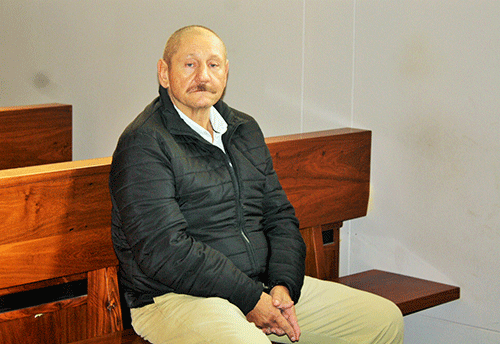Ernst Lichtenstrasser, the man who shot two people at the Namibian Institute of Mining and Technology (NIMT)’s entrance in 2019, acted with direct intent, Windhoek High Court Judge Christi Liebenberg said yesterday when he convicted him on all counts he faced.
He has been on trial for the deaths of two of his superiors – NIMT executive director at the time Eckhardt Mueller, and his deputy Heinz Heimo Hellwig.
Mueller and Hellwig died in the morning hours of 15 April 2019 after being gunned down at the entrance of the NIMT offices at Arandis.
He further faced two charges of possessing a firearm without a licence, and another charge of possessing ammunition without a licence, defeating or obstructing the course of justice, theft, and the unauthorised supply of a firearm and ammunition.
The judge stated that there is no doubt in his mind that Lichtenstrasser is guilty of the horrendous killings. While there was no eyewitness to the brutal murders, the judge said, the evidence adduced during the trial established the guilt of the accused beyond a reasonable doubt.
“Although the breaking-down of a body of evidence into different components is quite useful, one must guard against a tendency to focus too intently on the separate and individual parts thereof, instead of evaluating it together with the rest of the evidence. When dealing with circumstantial evidence, the court should not approach such evidence on a piecemeal basis and subject each individual piece of evidence to a consideration of whether it excludes the possibility that the explanation given by an accused is reasonably true,” the judge said.
In this instance, he went on, the cumulative effect of the circumstantial evidence led to one inescapable conclusion – that it was Lichtenstrasser who murdered the two men. He further said that in following a holistic approach in assessing the evidence as a whole and when full regard is had to the merits and demerits of both state and defence witnesses, as well as the probabilities, then he is satisfied that Lichtenstrasser’s version as regards to events which led to the murder of the deceased persons is not only improbable, but false beyond a reasonable doubt.
With regards to the confession, the judge said what is stated therein was from the mind of someone with full knowledge of the events which occurred, and not from the insinuations planted in his mind by his interrogators, like the accused wanted the court to belief.
“From the evidence presented, it is possible to infer that the accused’s actions were pre-planned, and appear to have taken form after the argument with his wife. He had reached the end of the road in resisting his transfer, while circumstances surrounding his son seemed to have exacerbated the insurmountable situation he found himself in,” Liebenberg said.
He added that when the accused left home, he not only had with him his licensed .38 revolver, but also an unregistered 9mm pistol, ultimately used in the killing of the deceased persons. The judge said this unlicensed weapon would, therefore, not have been linked to the accused, and was abandoned and buried in the desert. The manner in which the deceased were shot in the head and body is a testament of acts committed with direct intent, the judge concluded.
The matter will return to court on 14 November for pre-sentencing procedures.
Lichtenstrasser is represented by Legal Aid lawyer Albert Titus, and the state by deputy prosecutor general Antonia Verhoef.



